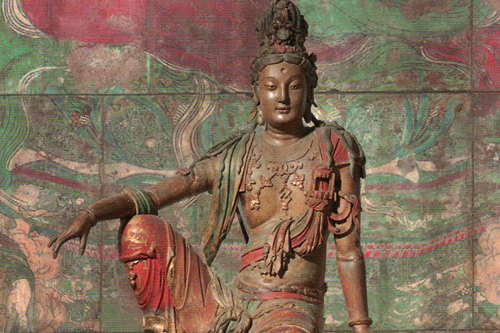

Widely acclaimed and deeply respected as a Buddhist classic, The Way of the Bodhisattva presents a spiritual roadmap to being a bodhisattva, a person who vows to save all beings from suffering and is committed to the enlightenment of all and universal benevolence. Its author was a scholar in eighth-century India.
The path of the bodhisattva involves “opening one’s heart to all circumstances and beings,” as Jack Kornfield notes in Bringing Home the Dharma. People dedicated to this ideal combine fearlessness and discipline, openness and compassion. It is said that everything they encounter and experience is viewed as the path—from their own vulnerability and humanness to the tears of the world.
One of the most radical notions in The Way of the Bodhisattva is “equalizing and exchanging self and other,” which is indispensable to cultivating bodhichitta, a heart fully dedicated to benefiting others. By an act of sympathetic imagination—really feeling that we and other people (whether friend, enemy, or stranger) are equal—we place ourselves in the position of others, instead of privileging ourselves. This enables us to gain an appreciation of their experience and subjective reality. When we equalize and exchange self and others, we don’t “become” the other person and they don’t “become” us. Rather, we try to equalize and later exchange the sense of who is most important, which for most of us (except masochists) is ourselves. The practice of equalizing and exchanging the importance of self and others so that they become equal in value is the soil from which deep love and compassion for other people grow.
Consider the example of Vimalakirti, a renowned bodhisattva who incarnated as a layman, rather than as a monk, and went among the people of the world. The bodhisattva can take numerous forms, from the patience and surrender of parenting to the caring and compassion of healing.
 Profound and inspiring, The Way of the Bodhisattva provides a remarkably noble ideal, an antidote to the take-for-granted selfishness that often seems pervasive. The bodhisattva ideal challenges and expands the excessive and one-sided self-absorption of individualistic Western culture. A life dedicated to the welfare of all is not only a deeply moving idea; it is a radical act, one that provides a path to cultivating patience and generosity, compassion and wisdom, qualities desperately needed to counteract the greed, hard-heartedness, and trauma that afflict so many. “If I have any understanding of compassion and the practice of the bodhisattva path,” writes the Dalai Lama, “it is entirely on the basis of this text.”
Profound and inspiring, The Way of the Bodhisattva provides a remarkably noble ideal, an antidote to the take-for-granted selfishness that often seems pervasive. The bodhisattva ideal challenges and expands the excessive and one-sided self-absorption of individualistic Western culture. A life dedicated to the welfare of all is not only a deeply moving idea; it is a radical act, one that provides a path to cultivating patience and generosity, compassion and wisdom, qualities desperately needed to counteract the greed, hard-heartedness, and trauma that afflict so many. “If I have any understanding of compassion and the practice of the bodhisattva path,” writes the Dalai Lama, “it is entirely on the basis of this text.”
Reading The Way of the Bodhisattva had a powerfully constructive and unexpected impact on me. It expanded my sense of benevolence, even as I was acutely aware of certain troubling aspects of Shantideva’s views.
For example, it views women as evil temptresses (“Whence have all these demon women sprung?”) and the body as disgusting (“This body, naked, as it is, untended, / Is indeed a nightmare to behold!”). It also encourages masochistic relations with other people (“Why should I not become the slave of others?”). Given its status as a classic, however, the book seems immune to critique. Whether the me-last, spiritual ideal of selflessness underlying Shantideva’s vision encourages people who struggle with self-care to further neglect themselves is a question that should be, but hasn’t been, raised.
Reading The Way of the Bodhisattva had a powerfully constructive and unexpected impact on me. It expanded my sense of benevolence, even as I was acutely aware of certain troubling aspects of Shantideva’s views. The world needs the extended beneficence and care toward wider groups of people outside our circle of intimates that The Way of the Bodhisattva recommends. But that spirit of boundless goodwill must never lose sight of, or be at the expense of, the value of the individual. Benevolence must, in other words, be integrated with self-respect and self-care. Otherwise, it tempers the disturbing narcissism permeating secular culture, even as it is itself imbalanced and one-sided and unwittingly fosters self-neglect.
When we feel a kinship with, and an attuned responsiveness toward, other people and ourselves—compassion without self-neglect—we might have a civilization with greater harmony and less discontent.



